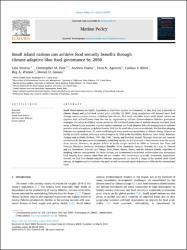/admin/item?itemID=ef5a33c5-71bd-435c-8919-6f67b56a294d
Small island nations can achieve food security benefits through climate-adaptive blue food governance by 2050

View/
Type of Access
OpenMaterial Type
ArticleType of Content
Scientific researchLanguage
EnglishCollection
- Investigación ambiental [1743]
Metadata
Show full item record| Abstract: | Small island nations are highly dependent on food from aquatic environments, or blue food, and vulnerable to climate change and global food market price volatility. By 2050, rising populations will demand more food through various protein sources, including from the sea. This study identifies which small island nations can improve food self-sufficiency from the sea by implementing tailored climate-adaptive fisheries governance strategies that adapt to shifting marine resources. |
| Author(s): | Teneva, Lida
Free, Christopher M. Hume, Andrew Agostini, Vera N. Klein, Carissa J. Watson, Reg A. Gaines, Steven D. |
| Date: | 2023 |
| Published: | Marine Policy, 151, 105577 |
| Citation: | Teneva, L., Free, C. M., Hume, A., Agostini, V. N., Klein, C. J., Watson, R. A., & Gaines, S. D. (2023). Small island nations can achieve food security benefits through climate-adaptive blue food governance by 2050. Marine Policy, 151, 105577. Recuperado de: |
| URI: | https://bvearmb.do/handle/123456789/2856
|

